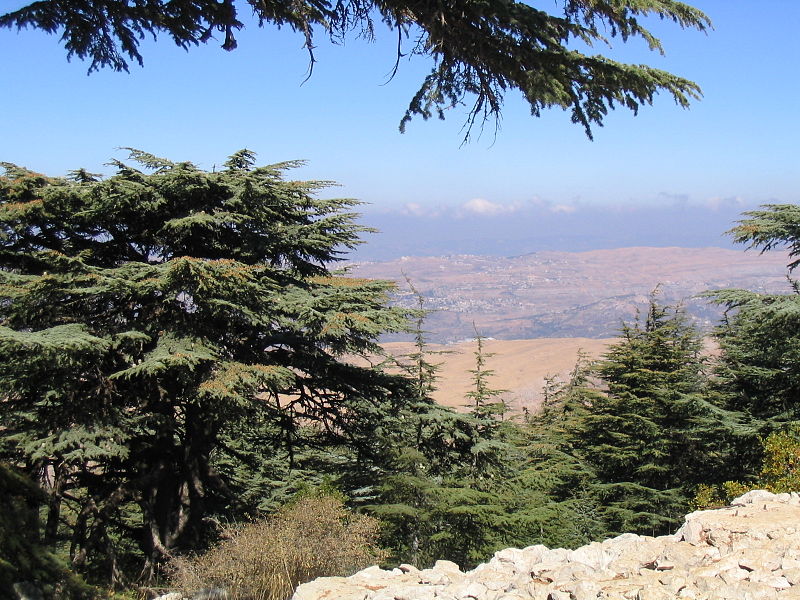27 Aug. Solomon obtains Lebanese timber to build the Temple
“Hiram, the king of Tyre, had always been David’s friend. When Hiram heard that Solomon had been made king in David’s place, he sent his messengers to Solomon. Solomon sent this message back to King Hiram: ‘You remember my father David had to fight many wars with the countries around him, so he was never able to build a temple for worshipping the LORD his God.’”
“’David was waiting until the LORD allowed him to defeat all his enemies. But now the LORD my God has given me peace on all sides of my country. I have no enemies now, and no danger threatens my people. The LORD promised my father David, “I will make your son king after you, and he will build a temple for worshipping me.”’”
“’Now, I plan to build that temple for worshipping the LORD my God. So send your men to cut down cedar trees for me from Lebanon. My servants will work with yours, and I will pay them whatever wages you decide. We don’t have anyone who can cut down trees as well as the people of Sidon.’”
“When Hiram heard what Solomon asked, he was very happy. He said, ‘Praise the LORD today! He has given David a wise son to rule over this great nation!’ Then Hiram sent back this message to Solomon: ‘I received the message you sent, and I will give you all the cedar and pine trees you want.’”
“’My servants will bring them down from Lebanon to the sea. There I will tie them together and float them along the shore to the place you choose. Then I will separate the logs there, and you can take them away. In return it is my wish that you give food to all those who live with me.’”
“So Hiram gave Solomon as much cedar and pine as he wanted. And Solomon gave Hiram about 2,000 tonnes of wheat each year to feed the people who lived with him. Solomon also gave him about 4,000 litres of pure olive oil every year.”
“The LORD gave Solomon wisdom as he had promised. And there was peace between Hiram and Solomon; these two kings made a treaty between themselves. King Solomon forced 30,000 men of Israel to help in this work. He sent a group of 10,000 each month to Lebanon. Each group worked in Lebanon for a month, then went home for two months…”
“Solomon forced 80,000 men to work in the hill country, cutting stone, and he had 70,000 men to carry the stones. There were also 3,300 men who directed the workers. King Solomon commanded them to cut large blocks of fine stone to be used for the foundations of the Temple. Solomon’s and Hiram’s builders and the men from Byblos carved the stones and the logs for building the Temple.”
(1 Kings 5:1-18)

Today’s passage records, in great detail, one of the first international trade deals to be reported in the Bible.
King Hiram of Tyre (in Lebanon, on the Mediterranean coast north of Israel) was a longstanding ally of King David, and was delighted to secure this hugely valuable contract to supply cedar and pine trees for the building of Solomon’s Temple in Jerusalem. Hiram’s workers were to fell the trees on the coastal mountains of Lebanon, transport them down to the coast, then assemble them into rafts to be floated along the coast to Israel.
In exchange, Israel was to supply the kingdom of Tyre with all the wheat and olive oil it needed to feed its people. This was a huge venture, and the vast quantities of cereals required would have come from across Solomon’s empire as well as from the coastal plain of Israel itself.
The whole operation demanded a vast international workforce, and Solomon enlisted 30,000 Israelites to join Hiram’s workers in Lebanon, a third of the workforce on duty in Lebanon at any one time.
Solomon also conscripted a further 150,000 men to cut and carry stone from the quarries of the Judaean hills to provide the foundations for the Temple in Jerusalem. We’re also told how Solomon made use of this vital treaty to hire expert stonemasons from the Lebanese city of Byblos to cut and trim the huge monoliths needed for the massive foundations. The whole operation was conducted on the same scale as the building of the vast pharaonic funerary temples in Egypt, and although we’re not told this, Solomon also no doubt made good use of the building and organisational skills of his other great ally, the Egyptians.
The photo (by Yhabbouche) shows cedars growing in the Barouk Forest of Lebanon.
You can read more about the city of Tyre and Solomon’s preparations to build the Temple @ https://thebiblejourney.org/biblejourney2/31-the-golden-age-of-israel-under-king-solomon/solomon-build-the-temple-in-jerusalem/
